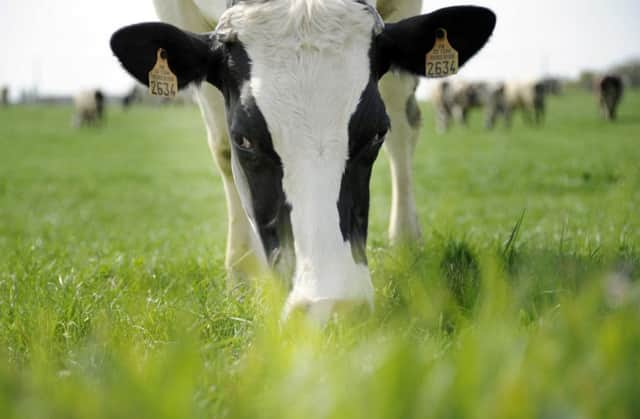Book shows how sustainable food could boost health


The first ever Scottish atlas of sustainable food will be a compendium of around 50 maps, charts and graphics showing the current situation in Scotland alongside projections for what it could be like two decades from now.
Among the issues tackled is a reduction in the amount of methane emitted by cows, which could be achieved by changing their diet or breeding new strains of cattle.
Advertisement
Hide AdAdvertisement
Hide AdProject leaders are describing the atlas as “the ultimate coffee table book” and hope it will work alongside a new interactive database to become a valuable educational resource.
Using the latest official data from organisations such as Forestry Commission Scotland, Scottish Natural Heritage and Greenspace, it will demonstrate the connections between food, energy consumption, economic viability, public health, environmental degradation and climate change.
The content will be wide-ranging, with the latest information on everything from pollution, the weather, diet and biodiversity to industry, land use, waste and food banks. The concept was dreamed up by Nourish Scotland, a voluntary organisation set up about five years ago to help improve the way food is produced and used.
Peter Ritchie, one of the group’s founders, said: “I want a freshness of perspective on how good our food system could be 20 years down the track, how we could have a fantastic, sustainable, health-promoting food system for Scotland. We could do it – we’ve got the land, we’ve got the people, we’ve got the skills. We just need to imagine better.
“We’ve covered vacant land, allotments, things like the potential of kelp seaweed. All over the world people are saying kelp is a fantastic human food, it’s a green fertiliser – what’s happened to our seaweed industry, how do we modernise it?”
One option, which scientists are already looking at, is converting the carbohydrates and sugar from seaweed into fuel to power cars.
Ritchie continues: “You look at vacant land – we’ve got something like 700 acres just here in Edinburgh, vacant and derelict land. And what about our renewable energy? All over the Western Isles we’ve got renewable energy to die for: wind, wave and tide power. So where are our heated greenhouses? Why aren’t we using that off-peak power to produce our own carbon-neutral tomatoes instead of bringing them in from Spain?”
Professor Mark Sutton is a scientist at the Centre for Ecology & Hydrology in Edinburgh, which is likely to be a source for the book. He’s also co-chair of the UN Economic Commission for Europe’s taskforce on reactive nitrogen.
Advertisement
Hide AdAdvertisement
Hide Ad“I can see it will really be a benefit to bring these different sources of information together,” he said. “If you’re talking about sustainable food, there’s so many different angles with it. One kind of food commodity might be bad for greenhouse gases, another for air pollution or water pollution. With this you’ll see them together.
“I very often liken, on a European scale at least, a map of ammonia emissions to a map of the foods we’re eating.
“It‘s really interesting to relate our food to its environmental imprint. Once you put that into the maps you can really start illustrating the link between what we eat and the environmental consequences.”
With soaring obesity levels, Scotland is the fat man of Europe, just behind the US in the world rankings. The problem is estimated to cost the NHS in Scotland £200 million a year.
Food and environment minister Richard Lochhead said: “Sustainable food production has long been a priority of mine and I welcome this project as Scotland works towards becoming a good food nation.”
The Scottish Government last month set out the latest phase in its first food and drink policy, including plans to create a Scottish Food Commission to highlight the key role food and drink plays in health, environment, economy and quality of life.
The new atlas has been welcomed by green campaigners.
Dr Richard Dixon, director of Friend of the Earth Scotland, said: “Using an atlas format to talk about local food and all the related issues from climate change to poverty is a great idea. Most people want to do the right thing but often don’t know where to find the right advice.”
Glasgow architects Lateral North will produce the glossy new book, due out next spring.